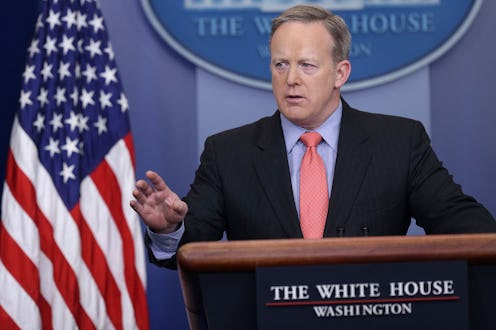News
Trump's Anti-Semitism Statement Isn't Enough

Less than half a day after the entire Senate urged the Trump administration to act in light of yet another wave of anti-Semitic threats on March 6 and 7, White House Press Secretary Sean Spicer seemed to oblige, releasing a statement condemning the threats "on the strongest terms" and referring to them as "hate crimes". A closer read of the White House statement though, delivered by Spicer rather than President Donald Trump himself, shows that it mimics similar White House statements made in February that didn't quell threats in the least. The latest White House statement on anti-Semitic threats does little more than pay lip service to growing anti-Semitism that deserves a task force and a bulked-up State Department response.
The Senate's impressive show of bipartisanship decrying anti-Semitism that might have prompted the White House response came on the back of an initial draft obtained by the press a day prior that pleaded with the president to not cut a State Department program focusing on anti-Semitism after speculation that the Trump administration was considering budget cuts that would do just that.
The White House response on March 7 not only mimics the administration's previous response to the spate of anti-Semitic threats, but also failed to mention the potential State budget cuts, let alone any other concrete means of investigating and prosecuting the perpetrators of these heinous threats.
There's no doubt that the Trump presidency's first six weeks have been rocky, and the creation or strengthening of investigations into religion-based hate crimes would take organization that the administration simply does not appear to have. All the same, it's seems weak to the point of softness that Trump and his team have done little more than make statements when the threat of anti-Semitism is obviously growing.
The White House's most recent response to anti-Semitic threats, along with the rapidly-updating news cycle that centers on executive and Congressional actions the day prior, also overshadowed Trump's alleged comments from late February, in which he reportedly made some unusual remarks about anti-Semitism. In an interview with BuzzFeed shortly before Trump's first Congressional address, Pennsylvania Attorney General Josh Shapiro alleged that Trump made some bizarre comments when asked about the rise in anti-Semitic threats. Shapiro claimed:
He just said, ‘Sometimes it’s the reverse, to make people — or to make others — look bad,’ and he used the word ‘reverse’ I would say two to three times in his comments. He did correctly say at the top that it was reprehensible.
The White House clarified that Trump was referring to protesters, not to the threats, though Shapiro told BuzzFeed that he wasn't sure what to make of the comments or what they meant.
As many have noted before and will undoubtedly continue to observe until the White House properly responds to the rising tide of anti-Semitism, Trump's lack of passionate response is ironic given that his daughter and son-in-law, both of whom are trusted advisors, are Jewish.
Only time will tell if Trump chooses to respond in a meaningful way to these threats before they become attacks.